|
Thomas A. Harris in his book, "I'm OK--You're Ok," says that all people are structurally alike
in that everyone has a Parent, an Adult, and a Child.
He points out that we differ in two ways.We differ in the content of Parent, Adult, and Child,
which it is unique to each person, and we differ in the functioning of the Parent, Adult, and Child.
There are two kinds of functional problems: contamination and exclusion.
These three ego states should stay separated which is ideal.
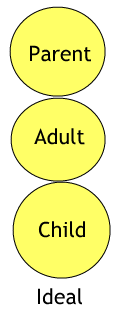 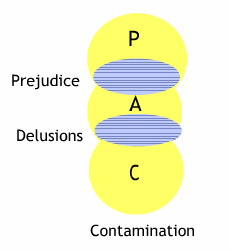
Diagram of three ego states overlapped.
The overlap as shown above is contamination of the Adult by dated, unexamined Parent data
which is externalized as true.
This is called prejudice.
For instance, beliefs such as "white skins is better than black skins," "right-handedness is better
than left-handedness," and "cops are bad" are externalized in transactions on the bases
of prejudgment, before reality data (Adult) is applied to them
Prejudice develops in early childhood when the opportunity of inquiry is shut on certain subjects
by the security-giving parents.
The little person dares not open it for fear of parental rebuke.
It is difficult to reason with a prejudiced person.
With some people you could present a logical and evidential case regarding racial issues
or left-handedness or any other subject that the person holds a prejudice about;
yet, the Parent in these people steadfastly dominates a portion of the Adult,
and they will surround their prejudicial cases with all kinds of irrelevant arguments
to support their position.
Even though it is illogical, there is safety for a little child in its rigidity to believe in a lie
than to believe his own eyes and ears.
So, one cannot eliminate prejudice by an Adult discourse on the subject of the prejudice.
The only ways to eliminate prejudice are to uncover the fact that it is no longer dangerous
to disagreed with one's parents and to update the Parent with data with today's reality.
So, treatment can be seen as separating Parent and Adult and restoring the boundary
between them.
The overlap above shows also the contamination of the Adult by the Child in a form of feelings
or archaic experiences which are externalized in the present.
Two of the most common symptoms of this kind of contamination are delusions and hallucinations.
A delusion is grounded in fear.
A person who would describe the world as hideous is describing how the world seemed to him
as a small child.
A little person who was in constant fear of brutality at the hands of angry, unpredictable parents
can, as a grownup, under stress, be flooded by the same fear to the extent that he can
fabricate "logical" supporting data.
He may believe that the neighbor down the street is coming to kill him, and have no basis
for that fear.
It can only be eliminated by uncovering the truth that the original threat to the Child
no longer exist externally.
Only as the Adult is decontaminated is it able to compute reality data.
Hallucinations are now the type of contamination of the Adult by the Child.
A hallucination is a phenomenon produced by extreme stress, wherein what was once
to experience externally -- degrogration, rejection, criticism -- is again experienced externally,
even though "no one is there."
A recorded experience "comes on for real" and the person "hears" voices that existed
in a past reality.
When you ask a person what the voices say, he or she characteristically will describe
the content as words of criticism, threat, or violence.
The more bizarre the hallucination the more bizarre was life for that person as a child.
These hallucinations are not hard to understand when we consider the actual types
of abuse, verbal and physical, to which some children are subjected.
In addition to contamination there is another functional disorder that explains how we differ.
That disorder is exclusion.
Eric Berne said, "Exclusion is manifested by a stereotyped, predictable attitude
which is steadfastly maintained as long as possible in the face of any threatening situation.
The constant Parent, the constant Adult, and the constant Child all result primarily
from defensive exclusion of the two complimentary aspects in each case."
This is a situation in which an Excluding Parent can "block out" the Child
or an Excluding Child can "block out" the Parent.
The Person Who Cannot Play
Typical of the Parent-Contaminated adult with a Blocked-Out Child is the person
who is dominated by duty, always working late, all business, and impatient with family members
who want to plan a vacation trip or a picnic in the park.
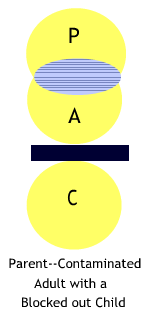
It is as if, at some point in his childhood he was so utterly squashed by serious, stern,
duty-bound parents that he found the only safe way to proceed through life was to turn
his Child off completely or to block it out.
He had had found, through experience, that every time he let it out there was trouble:
"Go to your room"; "Children should be seen and not heard"; "How many times must I tell you…";
"Grow up!"
If this little person also was rewarded for perfect conformity, diligent effort, compliance,
and doing exactly as he was told, the path of wisdom appeared to be total conformity
to the Parent and total blocking out of childlike impulses.
This type of person has very little happiness recorded in his Child.
He probably never will be able to let his happy Child out, because he has very little
happy Child.
However, he can be helped to appreciate that his position is not fair to his own family
and to his own children and that, indeed, his marriage may break up if he persists in trying
to block out the Child in his wife and children.
He can with purposeful effort by his Adult, take a trip with his family, cut down his office hours,
listen lovingly (an Adult discipline) to his children's fantasies, and participate in their life.
He can, with his Adult, establish a value of being loving or of preserving his family.
He will not change the nature of his Parent or create a happy Child which is not within him,
but he can achieve the insight which makes it possible to build a satisfactory life
in the present.
A Person Without A Conscience
A more serious difficulty paticularly in society is presented by the Child-Contaminated Adult
with a Blocked-Out Parent.
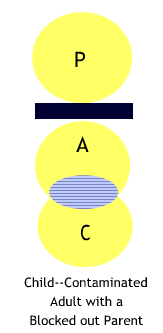
This condition develops in the person whose real parents, are those who fulfilled the parental role,
were so brutal and terrifying or, in the other extreme, so doltishly indulgent that the only way
to preserve life was to "shut them off" or block them out.
This is typical of the psychopath.
This is the person who at some point early in life gives up the first position, I'm not OK-You're Ok,
and assumes a new one, I am OK-You're Not Ok.
This little person concludes correctly that his parents are in fact Not OK.
They are so Not OK that he excludes them entirely.
In the extreme he may do this by homicide.
If not this, he at least excludes them psychologically, so that, in a sense, he does not
have a Parent.
He excludes the painful Parent, but he also excludes what little "good" there is in the Parent.
This person does not have available to his current transactions any tapes which supply data
having to do with social control, appropriate "shoulds" and "should nots," cultural norms,
or what, in one sense, may be referred to as a conscience.
His behavior is dominated by his Child which, through the contaminated Adult, manipulates
other people to satisfy his own ends.
His Adult is able to estimate consequences, but the consequences he is concerned with
have to do with whether or not he will be caught and seldom contain elements
of concern for others.
Although there may be exceptions, the general rule is that we do not learn to be loving
if we have never been loved.
If the first five years of life consist totally of a critical struggle for physical and
psychological survival, the struggle is likely to persist throughout life.
One way to determine whether or not a person has a Parent is to determine the existence
of feelings of shame, remorse, embarrassment, or guilt.
These feelings, which exist in the Child, turn on as the Parent "beats on the Child."
If these feelings do not exist, it is probable the Parent has been Blocked-Out.
It is a safe assumption that if a man who has been arrested for child-molestation
does not express any feelings of remorse or guilt -- apart from the fact that he was caught
-- he does not have a functioning Parent.
This has prognostic implications for rehabilitation.
The treatment of such a person is difficult.
One cannot evoke a Parent where one does not exist.
A criminal psychopath can understand his (P)-A-C to the extent that his Adult can direct
his future activities in such a way that his pattern of crime, arrest,
and conviction can change.
He may never have an operational Parent to back up his Adult, but his Adult can become
strong enough to carry him through a successful life wherein he gains the approval
and even esteem of others.
It is on this possibility that rehabilitative efforts in the field of corrections must be based.
The Decommissioned Adult
The person who has a Blocked-out Adult is psychotic.
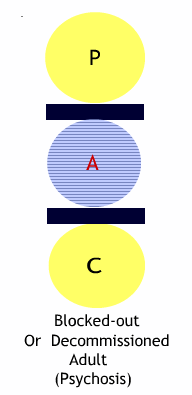
This person's Adult is not functioning, and therefore he is out of touch with reality.
His Parent and Child come on straight, frequently in a jumbled mixture of archaic data,
a jumbled replay of early experiences that do not make sense now because they did not
make sense when they were recorded.
Thomas A. Harris in his book, I'm OK-You're Ok, tells of a female hospital patient whose singing
of hymns (Parent) was interspersed with obscenities relating to body functions (Child).
The content was bizarre, but seemed to replay an old Parent-Child conflict between
good and bad, should and should not, salvation and damnation.
The content of those verbal productions quickly revealed a great deal about
her Parent and Child.
The fact that her Adult was gone indicated the severity of the conflict.
She was at the mercy of the same terrifying feelings which existed in her as a child.
The first step in treating a psychotic patient is to reduce these feelings of terror.
Basic to the recovery of the patient is that from his first encounter with the therapist
he sense the demonstrated position I'm OK-You're Ok.
Getting the Adult to emerge is the beginning of the re-establishment of contact with reality,
and the stage is set for the learning of P-A-C, to which further discovery can be made
by the patient about his own behavior.
In extreme cases this person should be referred to those who have the expertise
and the treatments that need to be administered.
Further studies can be made in I'm OK-You're Ok concerning of the periodic blocking-out
of the Manic-Depressive personality.
The constant bore is also considered,
To understand our own P-A-C, we can come to understand not only what is in
the Parent and the Child, but also what is not there.
If the girl who bemoans the fact that "I am plain and dull… that's just the way I am"
can appreciate the deficiency in her Parent and Child because her introduction to the life
was plain and dull, she can then be free, with her Adult, to reach out to reality
and discover what is not plain and dull.
It may take her a while to catch up, and she won't turn in to the life of the party overnight,
but she can at least be helped to see that she has a choice.
It has been said that blaming your faults on your nature does not change
the nature of your faults.
So, "I am like that" does not help anything.
"I can be different" does.
|